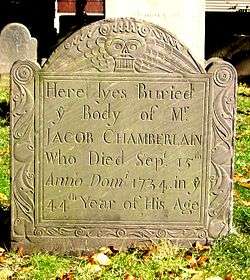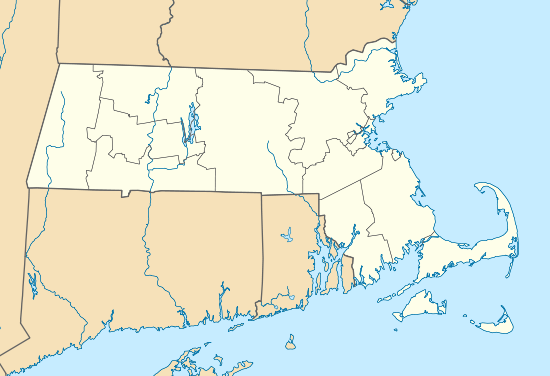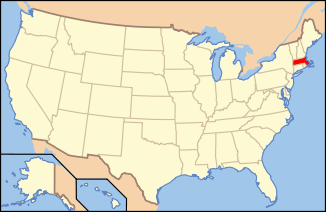Rumney Marsh Burying Ground
The Rumney Marsh Burying Ground is a historic cemetery on Butler Street between Elm and Bixby Streets in Revere, Massachusetts. It was added to the National Register of Historic Places in 2004.[1] It was the first burying ground of an area that now encompasses Revere as well as neighboring Chelsea and Winthrop.[2]
Rumney Marsh Burying Ground | |
 | |
  | |
| Location | Butler St. at Elm and Bixby Sts., Revere, Massachusetts |
|---|---|
| Coordinates | 42°24′28″N 71°0′21″W |
| Area | less than one acre |
| Architect | Lamson, Joseph |
| NRHP reference No. | 04000025 [1] |
| Added to NRHP | February 11, 2004 |
The land was originally owned by Samuel Cole. In 1654 William Hasey purchased it; his descendants sold it to Joshua Cheever, Esq. in 1740. Cheever and the town of Chelsea (of which Revere was still part) agreed on March 7, 1743 that the land would be a burying place and he deeded it to the town on December 8, 1751.[2]
Prior to the establishment of this burying ground, people who lived in the area were buried in Boston's Copp's Hill Burying Ground. After a smallpox epidemic swept the city in 1690, Boston officials ordered that its victims north of the Charles River be buried "on that side of the Water".[2] Some victims of this epidemic may have been the first burials at Rumney Marsh. The first documented burial was that of Mary Smith, wife of John Smith, in 1693.[2] The last burial was in 1929.[3]
Since many of the burials were in the 18th century, the cemetery gives a good picture of funerary art during the colonial period. Many of the slate gravestones from that period show the skull and wings motif that was common in the period. Two gravestones have been specifically identified as the work of carver Joseph Lamson (1658-1722): that of Mary Cutler (died 1703), and that of John Winthrop's son Deane (died 1703/4).[2]
People buried in the cemetery include:[3]
- Deane Winthrop, son of John Winthrop, governor of the Massachusetts Bay Colony. Deane Winthrop's House, also on the National Register, is nearby in Winthrop.
- Phillips Payson, the fighting pastor, hero of the Battle of Lexington
- Sixteen slaves
- Veterans of the Colonial, Revolutionary, 1812, and Civil Wars.
References
- "National Register Information System". National Register of Historic Places. National Park Service. March 13, 2009.
- "NRHP nomination for Rumney Marsh Burying Ground". Commonwealth of Massachusetts. Retrieved 2014-01-02.
- Recent large granite plaque at the entrance.
| Wikimedia Commons has media related to Rumney Marsh Burying Ground. |



